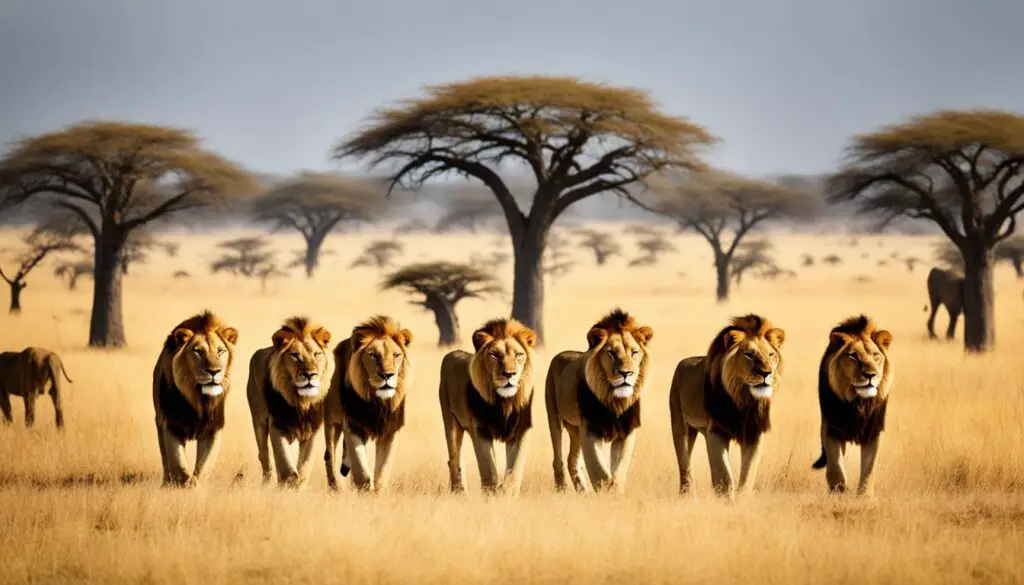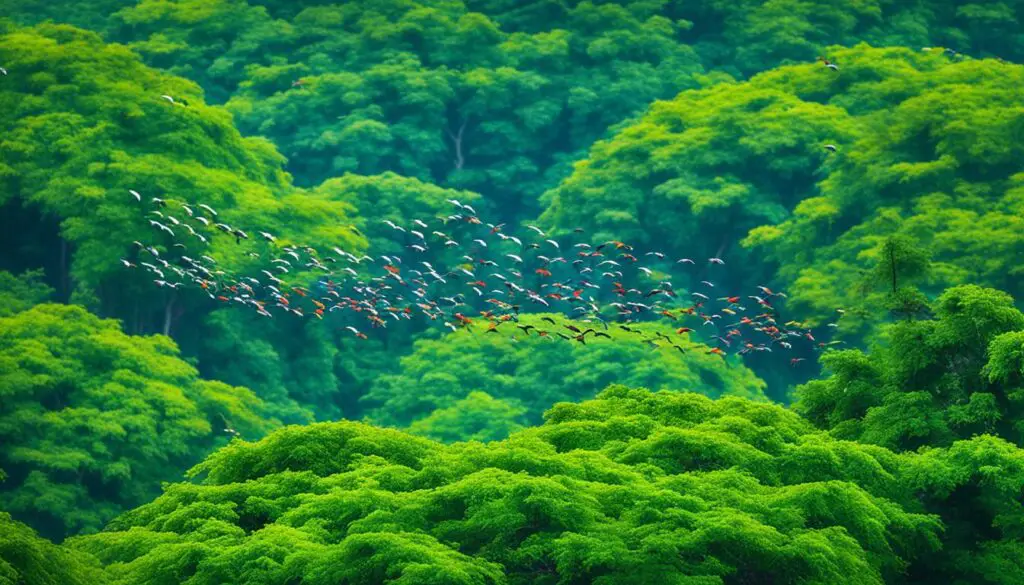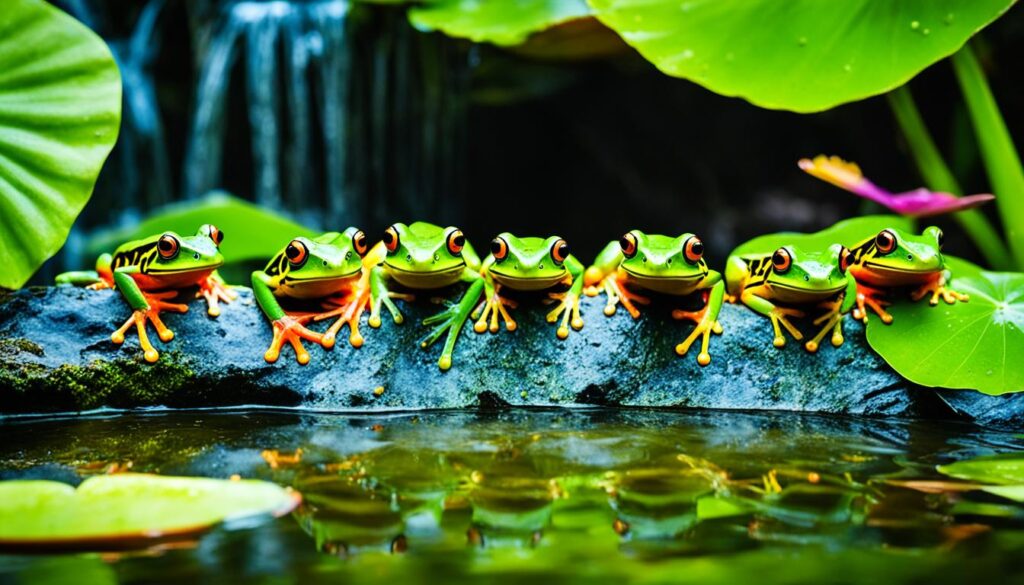Did you know that Nigeria is home to approximately 290 mammal species and 940 bird species? That’s an impressive array of animal biodiversity packed into one West African country! From the expansive savannas to the lush rainforests and coastal plains, Nigeria’s diverse habitats provide a haven for a wide range of African animals.

Key Takeaways:
- Nigeria boasts a significant number of mammal and bird species, making it a biodiverse hotspot.
- Conservation efforts are necessary to protect endangered species and preserve Nigeria’s rich wildlife.
- Nigeria’s diverse ecosystems, including mangrove swamps, rainforests, and savannas, support a wide range of animal species.
- Protecting Nigeria’s wildlife is crucial for maintaining ecological balance and benefiting local communities.
- By prioritizing wildlife conservation, Nigeria can safeguard its natural heritage for future generations.
Mammals of Nigeria
Nigeria is home to a diverse array of mammal species, making it an important destination for wildlife enthusiasts and researchers. From majestic lions and leopards to massive elephants and graceful giraffes, the Nigerian mammal population is rich and varied. However, the conservation status of many of these mammals is a cause for concern.
Endangered mammals in Nigeria face numerous threats, including habitat loss, poaching, and human-wildlife conflict. The destruction of natural habitats due to deforestation, urbanization, and agricultural expansion has resulted in a significant decline in the population of several species. To combat this, various conservation efforts are underway in Nigeria.
National parks and wildlife reserves play a critical role in protecting and conserving Nigerian mammals. Ol Pejeta Conservancy, Yankari Game Reserve, and Gashaka-Gumti National Park are just a few examples of the protected areas dedicated to safeguarding wildlife in Nigeria. These reserves provide shelter and safe havens for endangered mammals, allowing their populations to recover.
To further promote the conservation of Nigerian mammals and their habitats, public awareness campaigns and community engagement initiatives are being implemented. These efforts aim to educate local communities about the importance of wildlife conservation and foster a sense of responsibility towards the protection of endangered species.
The collaboration between government agencies, NGOs, and local communities is crucial in ensuring the long-term survival of Nigerian mammals. By working together, we can make a significant difference in preserving the country’s biodiversity and securing a sustainable future for generations to come.
Let us now take a look at some of the iconic mammal species found in Nigeria:
Lions:
Nigeria is home to a small population of lions, primarily found in the Kainji Lake National Park. These magnificent big cats are symbolic of Africa’s wildlife and are revered for their strength and beauty.
Leopards:
Leopards are widely distributed across Nigeria’s forests and savannas. These elusive predators are known for their agility and adaptability, making them highly successful hunters.
Elephants:
Elephants are the largest land animals on Earth, and Nigeria is fortunate to have populations of both forest and savanna elephants. These gentle giants play a vital role in maintaining healthy ecosystems.
Giraffes:
The Nigerian Giraffe Conservation Foundation is dedicated to protecting the endangered West African giraffe, whose population is limited to Niger, Cameroon, and Nigeria. These majestic creatures are known for their towering height and distinctive spotted patterns.
Chimpanzees:
Chimpanzees are Nigeria’s closest living relatives, sharing approximately 98% of our DNA. These highly intelligent primates are found in the forests of southwestern Nigeria and are known for their complex social structures and tool-using abilities.
| Mammal Species | Conservation Status |
|---|---|
| Lion | Endangered |
| Leopard | Near Threatened |
| Elephant | Vulnerable |
| Giraffe | Endangered |
| Chimpanzee | Endangered |
Birds of Nigeria
Nigeria is a haven for birdwatchers, with a diverse range of bird species found within its borders. Over 940 bird species have been recorded in Nigeria, making it a paradise for bird enthusiasts.
One of the remarkable aspects of Nigerian birdlife is the presence of several unique endemic species, found nowhere else in the world. These endemic birds are a testament to the country’s rich avian biodiversity and the importance of protecting their habitats.
Endemic Birds in Nigeria
Among the rare endemic bird species in Nigeria is the Ibadan malimbe. This small passerine is found exclusively in the forests of southwestern Nigeria, making it a sought-after sighting for birdwatchers.
Another notable endemic bird is the Jos Plateau indigobird. This attractive finch species is found only in the grasslands and shrublands of the Jos Plateau in central Nigeria.
The rock firefinch is another unique bird species found in Nigeria. It inhabits rocky areas, particularly in the northern regions of the country.
The Anambra waxbill, with its vibrant plumage, is yet another endemic bird species in Nigeria. It can be spotted in the wetlands and grasslands of the Anambra Basin.
These endemic birds highlight the need for conservation efforts to safeguard their habitats and ensure their long-term survival.
Bird Species Diversity in Nigeria
The bird species in Nigeria are not limited to endemics alone. The country’s diverse ecosystems, ranging from coastal areas to rainforests and savannas, provide habitats for various avian species.
Some of the other bird species found in Nigeria include the African fish eagle, marabou stork, grey-headed kingfisher, and helmeted guineafowl.
Whether you’re an avid birdwatcher or a nature enthusiast, Nigeria offers a treasure trove of bird species waiting to be discovered.

| Common Name | Scientific Name | Habitat |
|---|---|---|
| Ibadan Malimbe | Malimbus ibadanensis | Forest |
| Jos Plateau Indigobird | Vidua maryae | Grassland, shrubland |
| Rock Firefinch | Lagonosticta sanguinodorsalis | Rocky areas |
| Anambra Waxbill | Estrilda poliopareia | Wetlands, grasslands |
Reptiles and Amphibians in Nigeria
Nigeria, with its diverse habitats, is a haven for a wide variety of reptiles and amphibians. From snakes and lizards to turtles and frogs, the country’s ecosystems provide ideal conditions for these cold-blooded creatures to thrive.
Among the notable reptiles found in Nigeria are the Nigerian crag gecko and the worm lizard, both of which are unique to the region. The Nigerian crag gecko is known for its vibrant colors and adaptability to different environments. The worm lizard, on the other hand, is a burrowing reptile that spends most of its life underground.
However, these reptiles, along with other amphibians in Nigeria, face numerous threats to their survival. Habitat destruction resulting from deforestation, urbanization, and agricultural practices is one of the leading causes of decline among these species. Illegal wildlife trade and the pet trade also contribute to the endangerment of these reptiles and amphibians.
Conservation efforts are crucial to protect the rich biodiversity of Nigerian reptiles and amphibians. Measures such as establishing protected areas, promoting sustainable land use practices, and educating communities about the importance of these species can contribute to their preservation. By conserving Nigerian reptiles and amphibians, we can safeguard their unique ecological roles and maintain the delicate balance of the country’s ecosystems.

Data on Nigerian Reptiles and Amphibians
| Category | Number of Species |
|---|---|
| Snakes | 98 |
| Lizards | 115 |
| Turtles | 21 |
| Frogs | 91 |
Table: Nigerian Reptiles and Amphibians
Conclusion
Nigeria’s rich biodiversity and wildlife are of utmost importance in maintaining the ecological balance and sustaining the well-being of both ecosystems and human communities. However, the country’s wildlife faces significant conservation challenges, including habitat loss, poaching, and human-wildlife conflict.
To safeguard Nigeria’s natural heritage and protect its diverse range of species, it is crucial to prioritize wildlife conservation efforts. This can be achieved through the establishment of protected areas, promoting community engagement, and implementing sustainable development practices.
By actively conserving Nigerian wildlife and protecting biodiversity, we can ensure the long-term viability of ecosystems and preserve the invaluable benefits they provide. It is our responsibility to take action now, safeguarding Nigeria’s iconic species and securing a sustainable future for generations to come.
